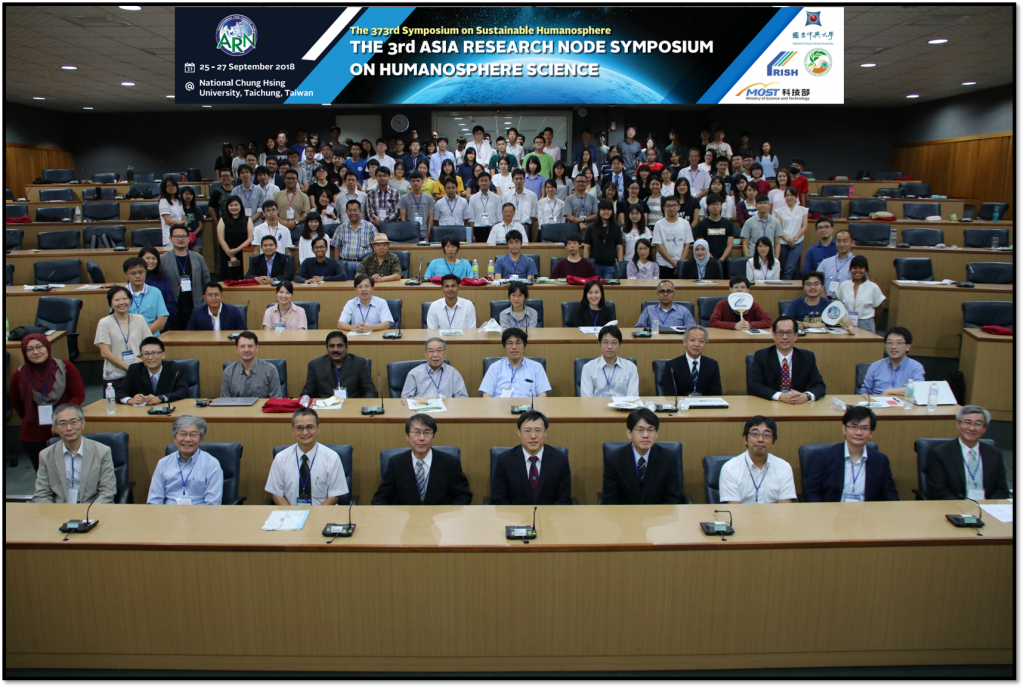The 3rd Asia Research Node Symposium on Humanosphere Science
Present and Future of Humanosphere Science
(The 373rd Symposium on Sustainable Humanosphere)
Updated: 2018/09/26
 |
The environment surrounding humans is rapidly changing with complicated interlinkages, threatening sustainable development and healthy living. There has been an increasing demand for reliable future projections based on an accurate understanding of current conditions of Humanosphere, and for the presentation of measures for solving the problems. To establish the Sustainable Humanosphere, international collaboration and expansion of Humanosphere Science on a global scale is important.
Research Institute for Sustainable Humanosphere (RISH) launched a new program called the Humanosphere Asia Research Node (ARN) in 2016. This program aims to strengthen its function as a hub for international collaborative research and foster innovation in the field of humanosphere science, with the ultimate goal of delivering solutions to global-scale problems. ARN integrates our various facilities and human networks in ASEAN region and Japan for consolidating the international collaborative research on “Sustainable Humanosphere”. To further strengthen the international network and to discuss “Present and Future of Humanosphere Science”, RISH planned to organize this symposium.
The symposium committee welcomes you to “The 3rd Asia Research Node Symposium on Humanosphere Science (The 373rd Symposium for Sustainable Humanosphere)” on September 25-27, 2018 at National Chung Hsing University, Taiwan. The symposium aims to share the concept and recent advances of Humanosphere Science, thereby fostering students and young researchers who will sustain and expand the new science.
The ARN Symposium will cover scientific and technological advances in the fields of material science, plant science, entomology, microbiology, ecology, forestry, wood science, chemistry, biochemistry, molecular biology, architecture, space science, atmospheric science, environmental science, electromagnetic engineering, agriculture and other related sciences contributing to creating “Sustainable Humanosphere”.
Humanosphere Asia Research Node Flyer
Date
September 25-27, 2018
Venue
National Chung Hsing University, Taichung, Taiwan
Agricultural & Environmental Science Building
10th Floor International Conference Hall
Access map: https://www.nchu.edu.tw/default/mid/615
| Campus map (PDF) |
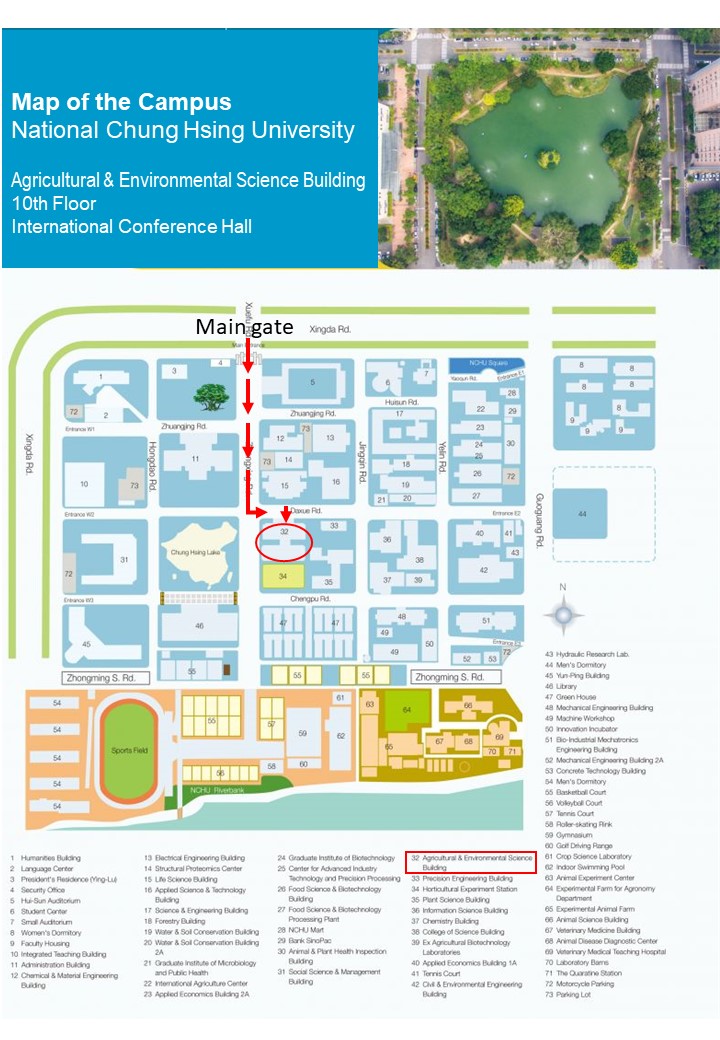 |
Program
Detailed Information for Program and Abstract
- program & Abstract
- Sessions
Session I: Present of Humanosphere Science
I-a. Atmospheric Observations with MST radars
Session Organizers: Prof. Hiroyuki Hashiguchi (RISH) and Prof. Jenn-Shyong Chen (China Medical University, Taiwan)
Atmospheric radars (or wind profilers) have been used for studying atmospheric structures and dynamics at various scales, as well as for operational applications. They are useful for investigating the fine-scale structure of the atmospheric fields from the planetary boundary layer all the way to the ionosphere. This session welcomes collaborative and innovative contributions devoted to the studies using radars and other instruments like lidars and in-situ equipment, and relevant modeling.
I-b. Plants for Sustainable Humanosphere –Biomass and Bioactive Compounds– (Tentative)
Session Organizers: Dr. Yuki Tobimatsu (RISH) and Dr. Ying-Hsuan Sun (NCHU)
The envisioned sustainable society relies on the technology developments for harvesting energy-rich fuels and high-value chemicals from plant biomass. In this session, a group of active researchers will address the recent advancements in plant genetics, biology, and interactions with microorganisms, related to the use of plant biomass for the production of energy and chemicals. (Tentative)
I-c. Water, carbon, and nutrient cycling in forest under climate change
Session Organizers: Dr. Guo-Zhang Song (National Chung Hsing University), and Dr. Masayuki Itoh (Hyogo Prefecture University)
Forest ecosystems play an important role in the water and carbon cycles. However, their effects on these cycles can vary substantially due to the differences of species composition and structure of forests. Establishing research networks to share data collected from regions can develop a broad views for of forest ecosystem functions on regulating our environment.
I-d. Our Footprints on Global Environment: Threats to Ecosystem Sustainability
Session Organizers: Dr. Chin-Cheng Yang (RISH) and Prof. Shaw-Yhi Hwang (NCHU)
This session will feature several anthropogenic threats to the sustainable future of ecosystem, including invasive species, climate change and insecticide overuse. Speakers will cover the current status of the threats and how to deal with them through a scientific-basis approach.
Session II: Future of Humanosphere Science
II-a. Energy Transfer and Conversion in Geospace
Session Organizers: Prof. Yoshiharu Omura (RISH) and Prof. Lou-Chuang Lee (Academia Sinica, Taiwan)
The energy flows in the geospace are strongly controlled by variation of solar wind and the interplanetary magnetic field. There occur various energy conversions in different regions of the magnetosphere, resulting in phenomena such as aurora, electromagnetic waves, and formation of radiation belts. Papers on observation, theory, and simulations of these phenomena in geospace are solicited.
II-b. Integrated Vector Management: a Strategy for Sustainable Humanosphere
Session Organizers: Prof. Wu-Chun Tu (National Chung Hsing University), and Dr. Lee-Jin Bong (National Health Research Institute, Taiwan)
Insect vectors of disease relies mostly on the use of insecticides, and are likely to remain so as long as effective. Due to rapid development of insecticide resistance in insects, and the possible environmental impact the chemicals could have caused, different control strategies for suppressing insect vector populations have been proposed. This session features new approach to vector control with the integration of traditional control measure that help improving the efficacy, cost effective, ecological soundness and sustainability of disease vector control, which will eventually reduce their reliance on insecticides.
II-c. Wireless Power Transfer for Sustainable Electronics
Session Organizers: Prof. Naoki Shinohara (RISH) and Prof. Heng-Ming Hsu (NCHU)
A wireless power transfer (WPT) technology can support future sustainable electronics. The WPT can be applied not only for Battery-less IoT (Internet Of Things) Sensor network but also for Solar Power Satellite. In this session, we focus on the WPT technology.
II-d. Atmospheric and ionospheric studies with new instruments and technology
Session Organizers: Prof. Mamoru Yamamoto (RISH) and Prof. Charles Lin (National Cheng Kung University, Taiwan)
Advancement of atmospheric/ionospheric studies largely depend on measurement instruments and technology. Examples are; Use of Global Navigation Satellite System (GNSS) for various environment measurements, Radar imaging by using multiple receivers or frequencies, Measurement with micro satellites or CubeSat constellation, and numerical simulations of the whole atmosphere and their assimilation run with real data, etc. These will open new paradigm for the related studies. We solicit variety topics that is related for future atmospheric/ionospheric studies that contribute to the humanosphere science.
Information for Oral/Poster Presentation
For Oral Speakers
You can use your own laptop. Please make sure that your file is properly displayed by connecting your PC to the projector well before your presentation.
If you want to use the laptop PC (Windows) provided in the session room, please bring a USB memory and copy your presentation file well in advance.
Please check your presentation time in the program
For Poster Speakers
Elevator Speech (Short presentation)
You are kindly requested to present 1-minute “elevator speech” for your poster during 17:00-18:00 on September 25.
You are also kindly requested to prepare one-page PowerPoint file for the elevator speech.
Submission form for Elevator speech is here
Please send both the PowerPoint file and its PDF file to us:
E-mail address: arn+abstract@rish.kyoto-u.ac.jp
- Please name your file using the following format: Poster number_Last name of the presenting author (for example: P03_Aoyama.pptx and P03_Aoyama.pdf)
- Please select ‘Standard (4:3 aspect ratio)’ as the slide size. You cannot use ‘Animation’.
- Please give your speech in order of poster number. Please check your poster number in the program.
- Submission PDF&PPT deadline: September 10th 2018 (Mon)
Poster Display
Poster Session : September 26 10:10-12:00 at Agricultural and Environmental Science Building.
You are encouraged to present your paper next to your poster in Poster Session.
- Poster board size: 120 cm(Height) x 85 cm(W) (A0 size recommended)
- Poster contributors are advised to mount posters at 9th or 10th floor from 8:30 on September 25 and unmount them by 15:30 on September 27.
Push pins will be provided to attach posters. - All poster presenters are kindly requested to print out their posters in advance since posters can not be printed out at the symposium venue.
Student Poster Award
‘Student Poster Award’ will be presented to a few excellent poster presenters among students in the closing ceremony.
Certificate
If you need the certificate(s) of participation and/or presentation in the 3rd ARN Symposium,
please request it to Secretariat (E-mail: arn+symposium2018@rish.kyoto-u.ac.jp).
We will send its PDF file by e-mail.
Banquet
Date: Tuesday, September 25, 2018
Time: 19:00-
Place: Park City Hotel Central Taichung
No.66, Minquan Rd., Central Dist., Taichung City 400, Taiwan
Tel. +886-4-2223-5678
http://www.parkcthotel.com/central-taichung/en/index.php
Excursion
Muh Sheng Museum of Entomology / Sun Moon Lake
Date: Wednesday, September 26, 2018
Time: 12:00-18:00
Fee: NT$250
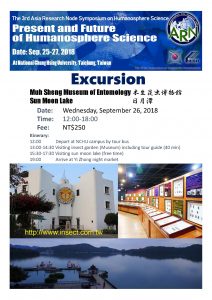 |
Transportation
Travel between the airport and Hotel (Taichung)
It is recommended to take an airport bus to Taichung (NT$ 240 for one way).
The bus arrives near the Taichung station of Taiwan Railways. It is a few hundred meters from there to the hotel (Park City Hotel Central Taichung).
If you want to use the Taiwan high speed rail (THSR),
please refer the access information below:
1. [Taipei (Taoyuan) airport] — [THSR Taoyuan Station]
– By taxi: approx. 20 minutes
– By shuttle bus: https://www.taoyuan-airport.com/english/high-speed-rail
Ticket price: NT$15
Ticketing: Tickets are sold at bus counters.
Intervals: 06:15-21:45 15-30 mins, 21:45:22:50 20-40 mins
Trip length: 25 minutes.
Time table: http://www.ubus.com.tw/html/bus/bus.php?num=81&route=705
2. [THSR Taoyuan Station] — [THSR Taichung Station]
– By Taiwan High Speed Rail: http://www.thsrc.com.tw/index_en.html
Trip length: approx. 40 minutes
Time table: One month ahead schedule is available to see from the above website.
3. [THSR Taichung Station] — Hotel
THSR Taichung Station is far from Taiwan Railways Taichung Station.
You have to use a taxi to your hotel.
Transportation service between hotel and venue
Bus transportation service between Park City Hotel Central Taichung and National Chung Hsing University is available.
The Assembly time on Sep. 25th has been changed as following.
Date Assembly Meeting Departing
time place time
9/25 8:15 Hotel lobby 8:30
9/26 7:45 Hotel lobby 8:00
9/27 7:45 Hotel lobby 8:00
Please come to the hotel lobby at 8:15 on 25th and at 7:45 on 26th and 27th.
On September 25 and 27, the bus will depart from the university after the session.
We will announce the details at the venue.
On September 26, the bus will depart at 12:00 for the excursion. After the excursion, the bus will
arrive at Yi Zhong night market. You have to go back to the hotel by yourself.
*There are no bus service from the university to the hotel on September 26.
Public Transportation (Bus) around venue and hotel
| From hotel to Bus stop (PDF) | From bus stop to venue (PDF) |
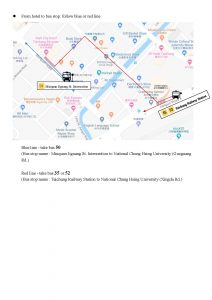 |
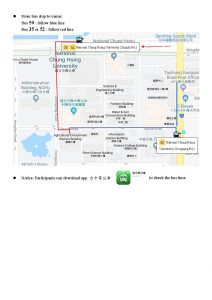 |
Organizing Committee
Co-Chair: Prof. Hiroyuki Hashiguchi, RISH, Kyoto University
Prof. Hwang Shaw-Yhi, National Chung Hsing University
Registration Form
If you are interested in the 3rd ARN symposium, please feel free to contact us: arn+symposium2018@rish.kyoto-u.ac.jp
No registration fees are charged.
Please pay only actual expenses for the excursion in the afternoon of September 26.
Call for Papers
Poster Presentation
Submission form for poster presentation
Poster board size: 120 cm(Height) x 85 cm(W) (A0 size recommended)
Abstract submission for oral and poster presentations is now closed.
Authors are kindly invited to submit an abstract related to the topic of the symposium.
(Note that oral presentation is mostly reserved for invited speakers. Most offered papers will be given poster presentation.)
Submission form for presentation is here.
Email:arn+abstract@rish.kyoto-u.ac.jp
Important date
Submission abstract deadline: June 10, 2018
Acceptance announcement: June 30, 2018
Visa Information
If you request us documents for your visa application, please refer to the websites of the Bureau of Consular Affairs, Ministry of Foreign Affairs, ROC. for more details
Websites of the Bureau of Consular Affais, Ministry of Foreign Affairs, ROC
Contact
General Chair: Prof. Hiroyuki Hashiguchi
Research Institute for Sustainable Humanosphere, Kyoto University
E-mail: hasiguti(at)rish.kyoto-u.ac.jp


